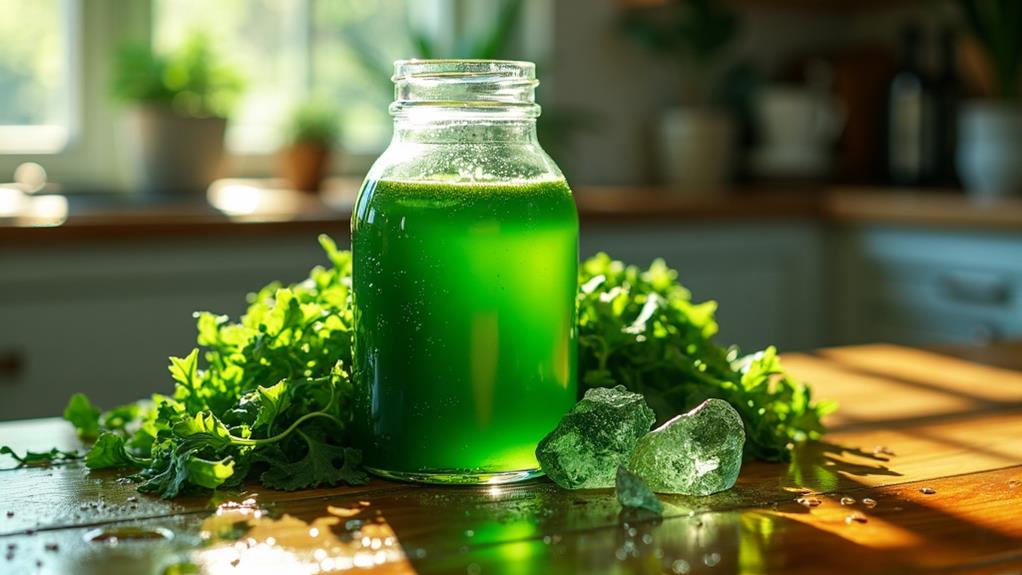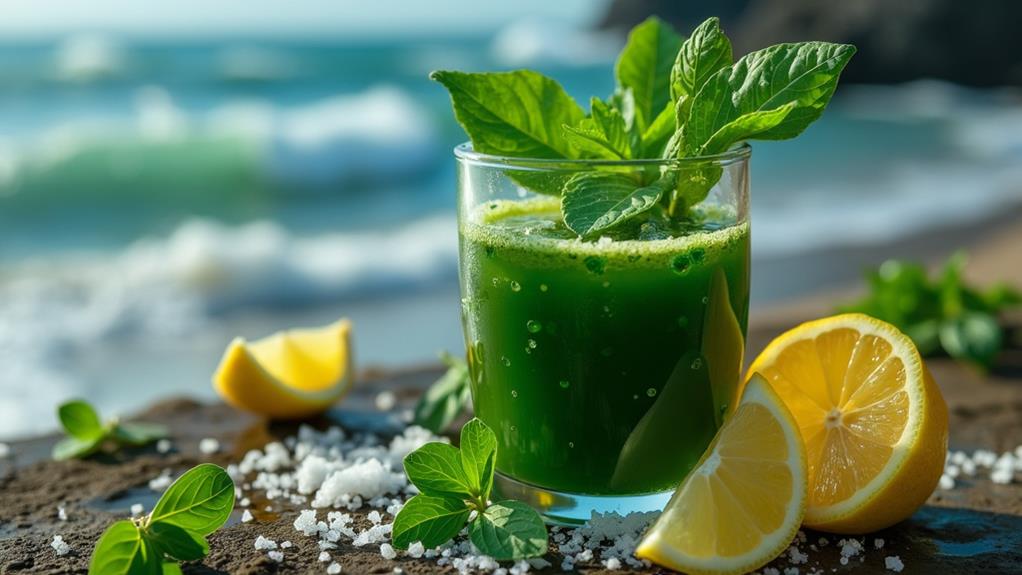Kelp Juice: Iodine-Rich Drink for Thyroid and Detoxification

Kelp juice is packed with nutrients and is an excellent choice for enhancing your thyroid function and aiding detoxification. With its high iodine content, it supports the production of thyroid hormones, regulating metabolism and energy levels. The juice is rich in antioxidants, which help combat oxidative stress and promote toxin removal. Kelp's unique compounds can also improve your digestion and skin health. It's essential to moderate your intake to avoid potential side effects, such as iodine excess or digestive discomfort. If you want to investigate more about its benefits and how to include it in your diet, there's plenty to uncover.
Nutritional Profile of Kelp Juice
When you investigate the nutritional profile of kelp juice, you'll find it's a powerhouse of significant nutrients. At the forefront is iodine, a fundamental element in promoting thyroid health. With certain varieties of kelp juice providing up to 2,984 micrograms of iodine per serving, you're ensuring your body receives an indispensable nutrient for maintaining healthy thyroid hormone production. This is particularly noteworthy since iodine is essential to your body's metabolic processes regulated by the thyroid.
Beyond iodine, kelp juice is packed with a variety of vitamins and minerals. You're getting a good dose of vitamin K, calcium, and magnesium, which are key players in supporting bone health and general metabolic function. These nutrients help keep your bones strong and your metabolism running smoothly.
In conjunction with supporting your thyroid and bones, kelp juice contains fucoxanthin. This compound is associated with weight loss and fat reduction, contributing a beneficial component to your weight management efforts. Additionally, the alginates in kelp juice can inhibit fat absorption and promote fat expulsion, aiding your digestive health. By incorporating kelp juice into your diet, you're embracing a nutrient-rich drink with impressive health-supporting properties.
Benefits for Thyroid Health
Kelp juice offers remarkable benefits for thyroid health, primarily due to its high iodine content. Iodine is critical for the production of thyroid hormones, which play an essential role in maintaining your metabolic function and general well-being. By consuming kelp juice, you can help prevent iodine deficiency—a significant risk factor for thyroid disorders like hypothyroidism and goiter. This is particularly significant if you have limited access to other iodine-rich foods.
The iodine content in kelp helps balance your thyroid hormone levels. This balance is crucial for the proper functioning of various organs, including your heart, brain, and skin. By supporting these hormones, kelp juice can enhance your energy levels and combat fatigue, often linked to poor thyroid function and low iodine levels in the body.
Additionally, kelp juice contains antioxidants and anti-inflammatory compounds that may contribute to thyroid health. These properties can reduce the risk of autoimmune thyroid diseases, providing an added layer of protection. Regularly incorporating kelp juice into your diet not only helps maintain thyroid health but also supports your body's overall vitality.
Detoxification Properties

Amidst the hustle of daily life, kelp juice emerges as a powerful ally in detoxification. Packed with antioxidants like fucoidan, it helps combat oxidative stress, supporting your body's natural detox processes. These antioxidants work tirelessly to neutralize free radicals, contributing to your comprehensive well-being. But that's not all—kelp juice's alginate content binds to heavy metals and toxins in your digestive tract, assisting in their removal. This means kelp juice isn't just a drink; it's a detox companion.
Healthy digestion is fundamental for effective detoxification, and kelp juice doesn't disappoint. It promotes beneficial gut flora and improves nutrient absorption, which aids the detox process. By nurturing your digestive system, you're ensuring that your body efficiently expels toxins.
Moreover, regular consumption of kelp juice supports liver function, an important organ for detoxification. Its rich vitamin and mineral content contribute to liver health, ensuring your body's primary detox organ operates at peak performance. The high iodine levels in kelp juice also regulate thyroid function, which is critical for metabolism and effective detoxification. By supporting your thyroid, kelp juice helps your body detoxify more efficiently, keeping you energized and balanced.
Potential Side Effects
In consideration of its benefits, it is crucial to acknowledge the potential side effects of kelp juice. With its high iodine content, excessive consumption may disrupt thyroid hormones, leading to hyperthyroidism or other thyroid dysfunctions, especially if you have a pre-existing thyroid condition. While addressing iodine deficiency, you must monitor your intake to avoid swinging to the opposite extreme, which could cause hypothyroidism or transient hyperthyroidism.
Additionally, kelp juice's fiber may cause gastrointestinal discomfort, such as bloating or gas. If you're sensitive to dietary fiber, start with small amounts and observe how your body reacts. Another concern is the high vitamin K levels in kelp juice, which could interfere with blood-thinning medications. If you're on anticoagulant therapy, consult your healthcare provider before adding kelp juice to your diet.
Moreover, be aware of potential heavy metals contamination in kelp juice, like arsenic and cadmium, especially if it is sourced from polluted waters. This contamination can pose health risks, so make sure you're purchasing from reputable sources. By being mindful of these potential side effects, you can enjoy the benefits of kelp juice while minimizing risks.
How to Incorporate Kelp Juice

While being mindful of potential side effects, you can still enjoy the nutritious benefits of kelp juice by incorporating it into your daily routine. Kelp juice is a versatile supplement to your diet, offering thyroid support through its iodine-rich properties. Start by mixing a tablespoon into your morning smoothie. It adds a nutrient-rich enhancement without greatly altering the flavor, making it an easy way to consume iodine-rich foods.
For a revitalizing drink, try diluting kelp juice with water or coconut water. This not only improves hydration but also adds vital electrolytes to your beverage. You can also use kelp juice as a base for salad dressings. Combine it with olive oil, lemon juice, and herbs for a nutritious dressing filled with iodine and antioxidants.
When cooking, add a tablespoon of kelp juice to soups or broths. This improves both the mineral content and flavor, making it a valuable supplement to savory dishes. Remember to consume kelp juice in moderation, about 1-2 tablespoons daily, to support thyroid function and detoxification. This way, you can enjoy its benefits while keeping your iodine intake balanced.
Sustainable Kelp Harvesting
Guaranteeing sustainable kelp harvesting is fundamental for maintaining the health of marine ecosystems and the biodiversity they support. Kelp forests are indispensable habitats for countless marine species, so it's significant to adopt responsible methods to protect these underwater wonders. By practicing sustainable kelp harvesting, you contribute positively to environmental health, allowing these ecosystems to thrive.
When considering sustainable practices, keep these points in mind:
- Selective Cutting: This involves carefully choosing which kelp to harvest, guaranteeing that enough is left behind to regenerate. This method helps maintain the integrity of kelp forests and supports the species that inhabit them.
- Allowing Regrowth Time: After harvesting, it's imperative to give the kelp time to regrow. This guarantees the long-term health and sustainability of both the kelp populations and the ecosystems relying on them.
- Kelp Farming: By cultivating kelp, you can contribute to food security and economic development while minimizing environmental impact. Farms can serve as a sustainable source of food and supplements and even help mitigate climate change by absorbing carbon dioxide.
Conservation efforts and regulations play a key role in preventing overharvesting, guaranteeing that kelp resources remain available for future generations while balancing economic benefits with environmental health.




